#indigenous film production company
Photo
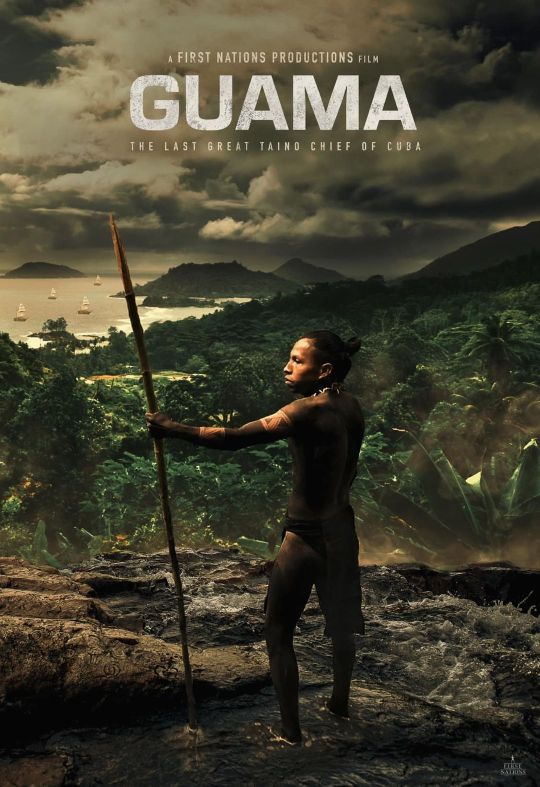
GALLERYYUHSELF - JANUARY 9th 2023 GUAMA TV DOCUMENTARY FILM go online for FREE viewing on our youtube channel - subscribe here so you don't miss it: https://www.youtube.com/channel/UCXZ3PIPXKu2xuMJUusZqAPg
The OFFICIAL VIP screening will be held in Barbados first before it gets posted online.
GUAMA the 22-minute TV Documentary version tells the tale of the often unsung hero - the Great Cuban Taino Chief Guama, and leaves you wanting more,
Hatuey (Supreme Taino Chief in Cuba in the rebellion against the Spaniards in 1512)Caonabo & Mayneri (the destroyers of the first Spanish settlement of La Navidad in Hispaniola)Mabey (Hispaniolan Taino leader who fought Spaniards in Cuba)Luquillo (one of the last Taino Chiefs in Puerto Rico to wage war against the Spaniards)Guayacayex (Taino Chief in Cuba who successfully massacred the Spaniards in 1510 in a revenge attack for Spanish atrocities) Guatiguana (the first Taino Chief in Hispaniola to organize a rebellion against the Spaniards)Guarocuya (Enriquillo - leader of a Taino rebellion against the Spaniards in Hispaniola)Agueybana II (leader of the Taino Rebellion of 1511 in Puerto Rico)
Instagram also @firstnationsproductions - the ONLY grassroots Caribbean 100% owned and operated Indigenous film company.
Also, visit our website at www.eagleclanarawaks.com to learn more about all of our unique and unprecedented local, regional, and international Indigenous actions and enterprises.
#galleryyuhself/Guama#galleryyuhself/documentary films#galleryyuhself/Caribbean indigenous film company#galleryyuhself/film#tumblr/Guama#tumblr/Tiano Chief#tumblr/Tiano peoples history#tumblr/Cuba#tumblr/first nations#Guama#documentary films#indigenous film production company#first nations#history#native perspective#taino#cuban history
23 notes
·
View notes
Text
Marvel Studios is an American film and television production company. Marvel Comics is an American comic book publisher.
As of the current date, the official BDS Movement has called for a Boycott of Marvel Studios upcoming Captain America film that features a zionist Israeli character who supports apartheid. There has been zero mention of Marvel Comics - or anything else Marvel - in either of their two statements I can currently find mentioning "Marvel" on their website, unless something is missing from that tag.
April 27, 2023: "Palestinians call for widespread boycotts of Marvel’s 2024 film, Captain America: New World Order, unless it drops Sabra/Ruth Bat-Seraph, its “superhero” that personifies the apartheid state of Israel. ... We encourage creative, peaceful protests to challenge Marvel Studios’ – and its owner Disney’s – complicity in anti-Palestinian racism, Israeli propaganda, and the glorification of settler-colonial violence against Indigenous people. ... We urge conscientious audiences worldwide to join us in boycotting Captain America: New World Order, and standing up for freedom, justice and equality."
November 23, 2023: "Marvel’s next Captain America film features Sabra/Ruth Bat-Seraph, a “superhero” personifying apartheid Israel. The character’s backstory includes working for the genocidal Israeli government and its occupation forces. By reviving this racist character in any form, Marvel is promoting Israel’s oppression of Palestinians. It is complicit in anti-Palestinian racism, Israeli propaganda, and glorifying settler-colonial violence. Tell Marvel you won’t buy its toys, clothes or accessories."
It is my understanding that the only way a boycott will work is if it's organized and targeted - thus the reason for BDS in the first place. The demand was that Marvel Studios remove the Israeli character from the film. Since the demand has not been met, then the boycott remains in place. But boycotting some random comic book writer's work and some comic book shop that makes pennies, with nothing to do with the MCU, is not what is being organized at this time.
The character in question hasn't even been featured in comics in 10 years - though of course she never should have been created in the first place. But Marvel Studios is choosing to pull her out of nowhere, when they have thousands and thousands of characters they could adapt instead. Please boycott Captain America: Brave New World (formerly titled New World Order) set to come out February, 2025, even if you're a Sam Wilson fan.
2K notes
·
View notes
Text
Couch surfer in his 30s. Oscar winner in his 40s. Why the whole world wants Taika
**Notes: This is very long post!**
Good Weekend
In his 30s, he was sleeping on couches. By his 40s, he’d directed a Kiwi classic, taken a Marvel movie to billion-dollar success, and won an Oscar. Meet Taika Waititi, king of the oddball – and one of New Zealand’s most original creative exports.
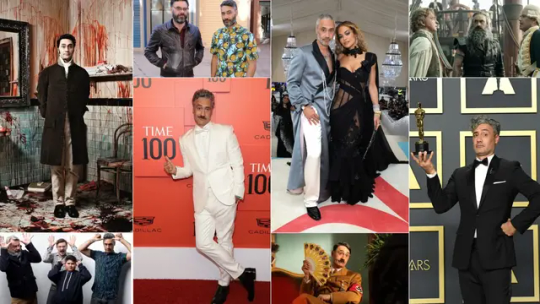
Taika Waititi: “Be a nice person and live a good life. And just don’t be an arsehole.”
The good news? Taika Waititi is still alive. I wasn’t sure. The screen we were speaking through jolted savagely a few minutes ago, with a cacophonous bang and a confused yelp, then radio silence. Now the Kiwi filmmaker is back, grinning like a loon: “I just broke the f---ing table, bro!”
Come again? “I just smashed this f---ing table and glass flew everywhere. It’s one of those old annoying colonial tables. It goes like this – see that?” Waititi says, holding up a folding furniture leg. “I hit the mechanism and it wasn’t locked. Anyway ��”
I’m glad he’s fine. The stuff he’s been saying from his London hotel room could incur biblical wrath. We’re talking about his latest project, Next Goal Wins, a movie about the American Samoa soccer team’s quest to score a solitary goal, 10 years after suffering the worst loss in the game’s international history – a 31-0 ignominy to Australia – but our chat strays into spirituality, then faith, then religion.
“I don’t personally believe in a big guy sitting on a cloud judging everyone, but that’s just me,” Waititi says, deadpan. “Because I’m a grown-up.”
This is the way his interview answers often unfold. Waititi addresses your topic – dogma turns good people bad, he says, yet belief itself is worth lauding – but bookends every response with a conspiratorial nudge, wink, joke or poke. “Regardless of whether it’s some guy living on a cloud, or some other deity that you’ve made up – and they’re all made up – the message across the board is the same, and it’s important: Be a nice person, and live a good life. And just don’t be an arsehole!”
Not being an arsehole seems to have served Waititi, 48, well. Once a national treasure and indie darling (through the quirky tenderness of his breakout New Zealand films Boy in 2010 and Hunt for the Wilderpeople in 2016), Waititi then became a star of both the global box office (through his 2017 entry into the Marvel Universe, Thor: Ragnarok, which grossed more than $1.3 billion worldwide) and then the Academy Awards (winning the 2020 best adapted screenplay Oscar for his subversive Holocaust dramedy JoJo Rabbit, in which he played an imaginary Hitler).

Waititi playing Adolf Hitler in the 2019 movie JoJo Rabbit. (Alamy)
A handsome devil with undeniable roguish charm, Waititi also slid seamlessly into style-icon status (attending this year’s Met Gala shirtless, in a floor-length gunmetal-grey Atelier Prabal Gurung wrap coat, with pendulous pearl necklaces), as well as becoming his own brand (releasing an eponymous line of canned coffee drinks) and bona fide Hollywood A-lister (he was introduced to his second wife, British singer Rita Ora, by actor Robert Pattinson at a barbecue).
Putting that platform to use, Waititi is an Indigenous pioneer and mentor, too, co-creating the critically acclaimed TV series Reservation Dogs, while co-founding the Piki Films production company, committed to promoting the next generation of storytellers – a mission that might sound all weighty and worthy, yet Waititi’s new wave of First Nations work is never earnest,
always mixing hurt with heart and howling humour.
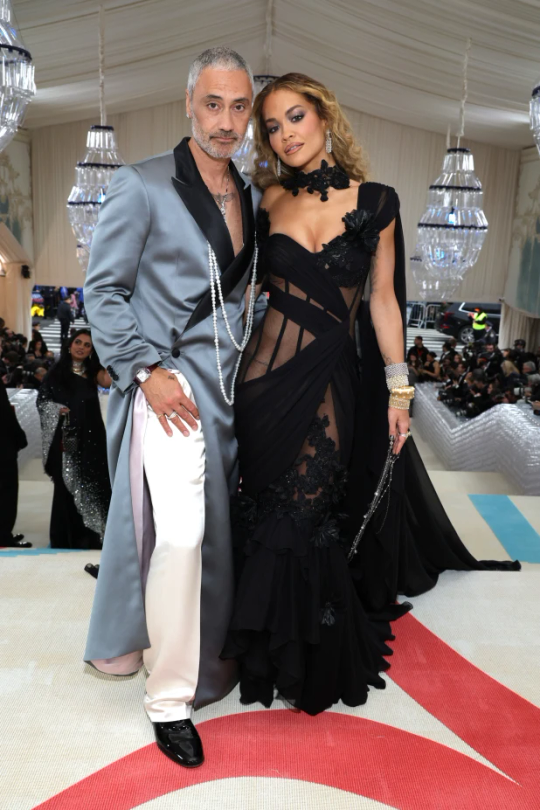
Waititi with wife Rita Ora at the 2023 Met Gala in May. (Getty Images)
Makes sense. Waititi is a byproduct of “the weirdest coupling ever” – his late Maori father from the Te Whanau-a-Apanui tribe was an artist, farmer and “Satan’s Slaves” bikie gang founder, while his Wellington schoolteacher mum descended from Russian Jews, although he’s not devout about her faith. (“No, I don’t practise,” he confirms. “I’m just good at everything, straight away.”)
He’s remained loyally tethered to his origin story, too – and to a cadre of creative Kiwi mates, including actors Jemaine Clement and Rhys Darby – never forgetting that not long before the actor/writer/producer/director was an industry maven, he was a penniless painter/photographer/ musician/comedian.
With no set title and no fixed address, he’s seemingly happy to be everything, everywhere (to everyone) all at once. “‘The universe’ is bandied around a lot these days, but I do believe in the kind of connective tissue of the universe, and the energy that – scientifically – we are made up of a bunch of atoms that are bouncing around off each other, and some of the atoms are just squished together a bit tighter than others,” he says, smiling. “We’re all made of the same stardust, and that’s pretty special.”
-----------------------------------------------
We’ve caught Waititi in a somewhat relaxed moment, right before the screen actors’ and media artists’ strike ends. He’s sensitive to the struggle but doesn’t deny enjoying the break. “I spent a lot of time thinking about writing, and not writing, and having a nice holiday,” he tells Good Weekend. “Honestly, it was a good chance just to recombobulate.”
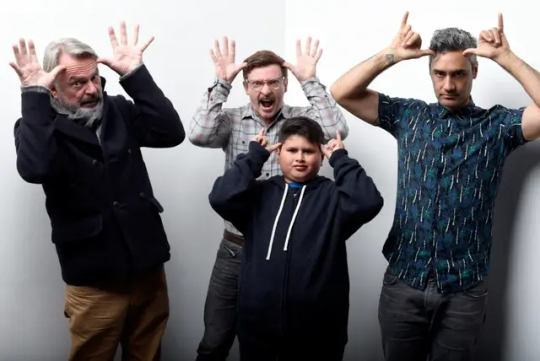
Waititi, at right, with Hunt for the Wilderpeople actors, from left, Sam Neill, Rhys Darby and Julian Dennison. (Getty Images)
It’s mid-October, and he’s just headed to Paris to watch his beloved All Blacks in the Rugby World Cup. He’s deeply obsessed with the game, and sport in general. “Humans spend all of our time knowing what’s going to happen with our day. There’s no surprises any more. We’ve become quite stagnant. And I think that’s why people love sport, because of the air of unpredictability,” he says. “It’s the last great arena entertainment.”
The main filmic touchstone for Next Goal Wins (which premieres in Australian cinemas on New Year’s Day) would be Cool Runnings (1993), the unlikely true story of a Jamaican bobsled team, but Waititi also draws from genre classics such as Any Given Sunday and Rocky, sampling trusted tropes like the musical training montage. (His best one is set to Everybody Wants to Rule the World by Tears for Fears.)
Filming in Hawaii was an uplifting experience for the self-described Polynesian Jew. “It wasn’t about death, or people being cruel to each other. Thematically, it was this simple idea, of getting a small win, and winning the game wasn’t even their goal – their goal was to get a goal,” he says. “It was a really sweet backbone.”
Waititi understands this because, growing up, he was as much an athlete as a nerd, fooling around with softball and soccer before discovering rugby league, then union. “There’s something about doing exercise when you don’t know you’re doing exercise,” he enthuses. “It’s all about the fun of throwing a ball around and trying to achieve something together.” (Whenever Waititi is in Auckland he joins his mates in a long-running weekend game of touch rugby. “And then throughout the week I work out every day. Obviously. I mean, look at me.”)
Auckland is where his kids live, too, so he spends as much time there as possible. Waititi met his first wife, producer Chelsea Winstanley, on the set of Boy in 2010, and they had two daughters, Matewa Kiritapu, 8, and his firstborn, Te Kainga O’Te Hinekahu, 11. (The latter is a derivative of his grandmother’s name, but he jokes with American friends that it means “Resurrection of Tupac” or “Mazda RX7″) Waititi and Winstanley split in about 2018, and he married the pop star Ora in 2022.
He offers a novel method for balancing work with parenthood … “Look, you just abandon them, and know that the experience will make them harder individuals later on in life. And it’s their problem,” he says. “I’m going to give them all of the things that they need, and I’m going to leave behind a decent bank account for their therapy, and they will be just like me, and the cycle will continue.”
Jokes aside – I think he’s joking – school holidays are always his, and he brings the girls onto the set of every movie he makes. “They know enough not to get in the way or touch anything that looks like it could kill you, and they know to be respectful and quiet when they need to. But they’re just very comfortable around filmmakers, which I’m really happy about, because eventually I hope they will get into the industry. One more year,” he laughs, “then they can leave school and come work for Dad.”
Theirs is certainly a different childhood than his. Growing up, he was a product of two worlds. His given names, for instance, were based on his appearance at birth: “Taika David” if he looked Maori (after his Maori grandfather) and “David Taika” if he looked Pakeha (after his white grandfather). His parents split when he was five, so he bounced between his dad’s place in Waihau Bay, where he went by the surname Waititi, and his mum, eight hours drive away in Wellington, where he went by Cohen (the last name on his birth certificate and passport).
Waititi was precocious, even charismatic. His mother Robin once told Radio New Zealand that people always wanted to know him, even as an infant: “I’d be on a bus with him, and he was that kind of baby who smiled at people, and next thing you know they’re saying, ‘Can I hold your baby?’ He’s always been a charmer to the public eye.”
He describes himself as a cool, sporty, good-looking nerd, raised on whatever pop culture screened on the two TV channels New Zealand offered in the early 1980s, from M*A*S*H and Taxi to Eddie Murphy and Michael Jackson. He was well-read, too. When punished by his mum, he would likely be forced to analyse a set of William Blake poems.
He puts on a whimpering voice to describe their finances – “We didn’t have much monneeey” – explaining how his mum spent her days in the classroom but also worked in pubs, where he would sit sipping a raspberry lemonade, doodling drawings and writing stories. She took in ironing and cleaned houses; he would help out, learning valuable lessons he imparts to his kids. “And to random people who come to my house,” he says. “I’ll say, ‘Here’s a novel idea, wash this dish,’ but people don’t know how to do anything these days.”
“Every single character I’ve ever written has been based on someone I’ve known or met or a story I’ve stolen from someone.” - Taika Waititi
He loved entertaining others, clearly, but also himself, recording little improvised radio plays on a tape deck – his own offbeat versions of ET and Indiana Jones and Star Wars. “Great free stuff where you don’t have any idea what the story is as you’re doing it,” he says. “You’re just sort of making it up and enjoying the freedom of playing god in this world where you can make people and characters do whatever you want.”
His other sphere of influence lay in Raukokore, the tiny town where his father lived. Although Boy is not autobiographical, it’s deeply personal insofar as it’s filmed in the house where he grew up, and where he lived a life similar to that portrayed in the story, surrounded by his recurring archetypes: warm grandmothers and worldly kids; staunch, stoic mums; and silly, stunted men. “Every single character I’ve ever written has been based on someone I’ve known or met,” he says, “or a story I’ve stolen from someone.”
He grew to love drawing and painting, obsessed early on with reproducing the Sistine Chapel. During a 2011 TED Talk on creativity, Waititi describes his odd subject matter, from swastikas and fawns to a picture of an old lady going for a walk … upon a sword … with Robocop. “My father was an outsider artist, even though he wouldn’t know what that meant,” Waititi told the audience in Doha. “I love the naive. I love people who can see things through an innocent viewpoint. It’s inspiring.”
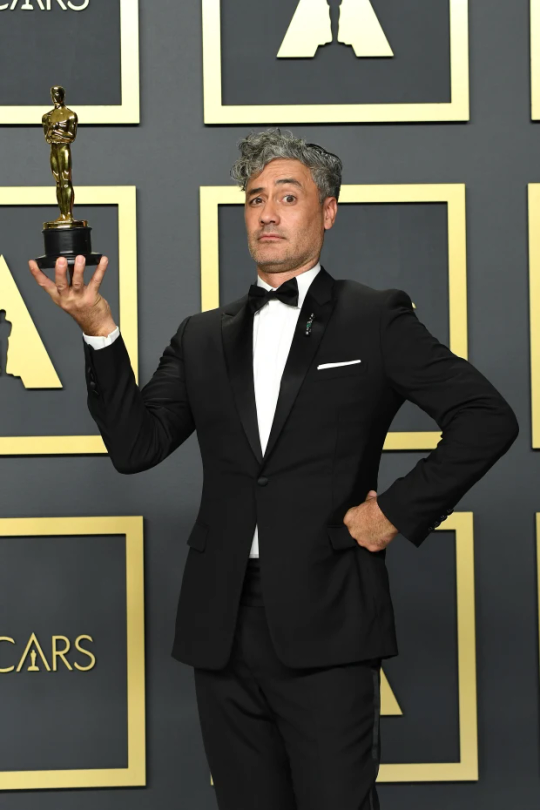
After winning Best Adapted Screenplay Academy Award for JoJo Rabbit in 2020. (Getty Images)
It was an interesting time in New Zealand, too – a coming-of-age decade in which the Maori were rediscovering their culture. His area was poor, “but only financially,” he says. “It’s very rich in terms of the people and the culture.” He learned kapa haka – the songs, dances and chants performed by competing tribes at cultural events, or to honour people at funerals and graduations – weddings, parties, anything. “Man, any excuse,” he explains. “A big part of doing them is to uplift your spirits.”
Photography was a passion, so I ask what he shot. “Just my penis. I sent them to people, but we didn’t have phones, so I would print them out, post them. One of the first dick pics,” he says. Actually, his lens was trained on regular people. He watches us still – in airports, restaurants. “Other times late at night, from a tree. Whatever it takes to get the story. You know that.”
He went to the Wellington state school Onslow College and did plays like Androcles and the Lion, A Midsummer Night’s Dream and The Crucible. His crew of arty students eventually ended up on stage at Bats Theatre in the city, where they would perform haphazard comedy shows for years.
“Taika was always rebellious and wild in his comedy, which I loved,” says his high school mate Jackie van Beek, who became a longtime collaborator, including working with Waititi on a Tourism New Zealand campaign this year. “I remember he went through a phase of turning up in bars around town wearing wigs, and you’d try and sit down and have a drink with him but he’d be doing some weird character that would invariably turn up in some show down the track.”
He met more like-minded peers at Victoria University, including Jemaine Clement (who’d later become co-creator of Flight of the Conchords). During a 2019 chat with actor Elijah Wood, Waititi describes he and Clement clocking one another from opposite sides of the library one day: a pair of Maoris experiencing hate at first sight, based on a mutual suspicion of cultural appropriation. (Clement was wearing a traditional tapa cloth Samoan shirt, and Waititi was like: “This motherf---er’s not Samoan.” Meanwhile, Waititi was wearing a Rastafarian beanie, and Clement was like, “This motherf---er’s not Jamaican.”)
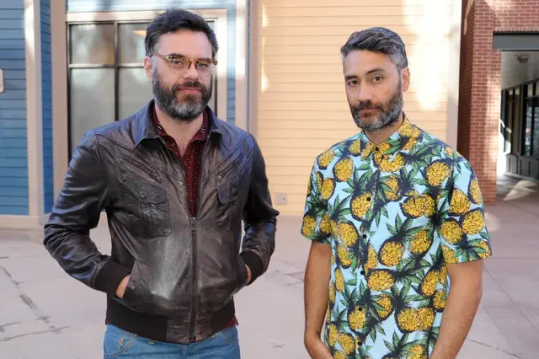
With Jemaine Clement in 2014. (Getty Images)
But they eventually bonded over Blackadder and Fawlty Towers, and especially Kenny Everett, and did comedy shows together everywhere from Edinburgh to Melbourne. Waititi was almost itinerant, spending months at a time busking, or living in a commune in Berlin. He acted in a few small films, and then – while playing a stripper on a bad TV show – realised he wanted to try life behind the camera. “I became tired of being told what to do and ordered around,” he told Wellington’s Dominion Post in 2004. “I remember sitting around in the green room in my G-string thinking, ‘Why am I doing this? Just helping someone else to realise their dream.’ ”
He did two strong short films, then directed his first feature – Eagle vs Shark (2007) – when he was 32. He brought his mates along (Clement, starring with Waititi’s then-girlfriend Loren Horsley), setting something of a pattern in his career: hiring friends instead of constantly navigating new working relationships. “If you look at things I’m doing,” he tells me, “there’s always a few common denominators.”
Sam Neill says Waititi is the exemplar of a new New Zealand humour. “The basis of it is this: we’re just a little bit crap at things.”
This gang of collaborators shares a common Kiwi vibe, too, which his longtime friend, actor Rhys Darby, once coined “the comedy of the mundane”. Their new TV show, Our Flag Means Death, for example, leans heavily into the mundanity of pirate life – what happens on those long days at sea when the crew aren’t unsheathing swords from scabbards or burying treasure.
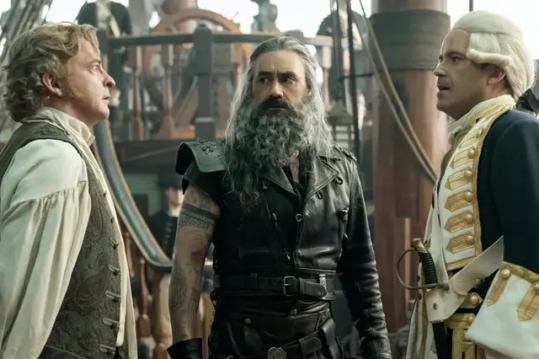
Waititi plays pirate captain Blackbeard, centre, in Our Flag Means Death, with Rhys Darby, left, and Rory Kinnear. (Google Images)
Sam Neill, who first met Waititi when starring in Hunt for the Wilderpeople, says Waititi is the exemplar of a new New Zealand humour. “And I think the basis of it is this,” says Neill. “We’re just a little bit crap at things, and that in itself is funny.” After all, Neill asks, what is What We Do in The Shadows (2014) if not a film (then later a TV show) about a bunch of vampires who are pretty crap at being vampires, living in a pretty crappy house, not quite getting busted by crappy local cops? “New Zealand often gets named as the least corrupt country in the world, and I think it’s just that we would be pretty crap at being corrupt,” Neill says. “We don’t have the capacity for it.”
Waititi’s whimsy also spurns the dominant on-screen oeuvre of his homeland – the so-called “cinema of unease” exemplified by the brutality of Once Were Warriors (1994) and the emotional peril of The Piano (1993). Waititi still explores pathos and pain, but through laughter and weirdness. “Taika feels to me like an antidote to that dark aspect, and a gift somehow,” Neill says. “And I’m grateful for that.”
-----------------------------------------------
Something happened to Taika Waititi when he was about 11 – something he doesn’t go into with Good Weekend, but which he considered a betrayal by the adults in his life. He mentioned it only recently – not the moment itself, but the lesson he learnt: “That you cannot and must not rely on grown-ups to help you – you’re basically in the world alone, and you’re gonna die alone, and you’ve just gotta make it all for yourself,” he told Irish podcast host James Brown. “I basically never forgave people in positions of responsibility.”
What does that mean in his work? First, his finest films tend to reflect the clarity of mind possessed by children, and the unseen worlds they create – fantasies conjured up as a way to understand or overcome. (His mum once summed up the main message of Boy: “The unconditional love you get from your children, and how many of us waste that, and don’t know what we’ve got.”)
Second, he’s suited to movie-making – “Russian roulette with art” – because he’s drawn to disruptive force and chaos. And that in turn produces creative defiance: allowing him to reinvigorate the Marvel Universe by making superheroes fallible, or tell a Holocaust story by making fun of Hitler. “Whenever I have to deal with someone who’s a boss, or in charge, I challenge them,” he told Brown, “and I really do take whatever they say with a pinch of salt.”
It’s no surprise then that Waititi was comfortable leaping from independent films to the vast complexity of Hollywood blockbusters. He loves the challenge of coordinating a thousand interlocking parts, requiring an army of experts in vocations as diverse as construction, sound, art, performance and logistics. “I delegate a lot,” he says, “and share the load with a lot of people.”
“This is a cool concept, being able to afford whatever I want, as opposed to sleeping on couches until I was 35.” - Taika Waititi
But the buck stops with him. Time magazine named Waititi one of its Most Influential 100 People of 2022. “You can tell that a film was made by Taika Waititi the same way you can tell a piece was painted by Picasso,” wrote Sacha Baron Cohen. Compassionate but comic. Satirical but watchable. Rockstar but auteur. “Actually, sorry, but this guy’s really starting to piss me off,” Cohen concluded. “Can someone else write this piece?”
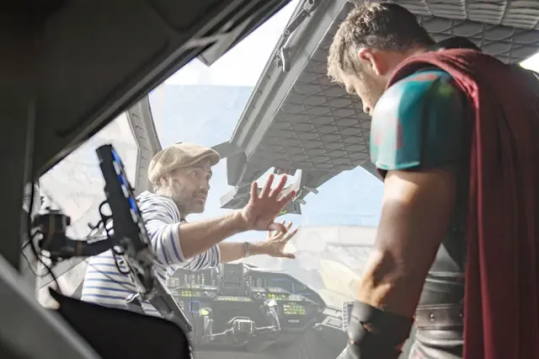
Directing Chris Hemsworth in 2017 in Thor: Ragnarok, which grossed more than $1.3 billion at the box office. (Alamy)
I’m curious to know how he stays grounded amid such adulation. Coming into the game late, he says, helped immensely. After all, Waititi was 40 by the time he left New Zealand to do Thor: Ragnarok. “If you let things go to your head, then it means you’ve struggled to find out who you are,” he says. “But I’ve always felt very comfortable with who I am.” Hollywood access and acclaim – and the pay cheques – don’t erase memories of poverty, either. “It’s more like, ‘Oh, this is a cool concept, being able to afford whatever I want, as opposed to sleeping on couches until I was 35.’ ” Small towns and strong tribes keep him in check, too. “You know you can’t piss around and be a fool, because you’re going to embarrass your family,” he says. “Hasn’t stopped me, though.”
Sam Neill says there was never any doubt Waititi would be able to steer a major movie with energy and imagination. “It’s no accident that the whole world wants Taika,” he says. “But his seductiveness comes with its own dangers. You can spread yourself a bit thin. The temptation will be to do more, more, more. That’ll be interesting to watch.”
Indeed, I find myself vicariously stressed out over the list of potential projects in Waititi’s future. A Roald Dahl animated series for Netflix. An Apple TV show based on the 1981 film Time Bandits. A sequel to What We Do In The Shadows. A reboot of Flash Gordon. A gonzo horror comedy, The Auteur, starring Jude Law. Adapting a cult graphic novel, The Incal, as a feature. A streaming series based on the novel Interior Chinatown. A film based on a Kazuo Ishiguro bestseller. Plus bringing to life the wildly popular Akira comic books. Oh, and for good measure, a new instalment of Star Wars, which he’s already warned the world will be … different.
“It’s going to change things,” he told Good Morning America. “It’s going to change what you guys know and expect.”
Did I say I was stressed for Waititi? I meant physically sick.
“Well…” he qualifies, “some of those things I’m just producing, so I come up with an idea or someone comes to me with an idea, and I shape how ‘it’s this kind of show’ and ‘here’s how we can get it made.’ It’s easier for me to have a part in those things and feel like I’ve had a meaningful role in the creative process, but also not having to do what I’ve always done, which is trying to control everything.”
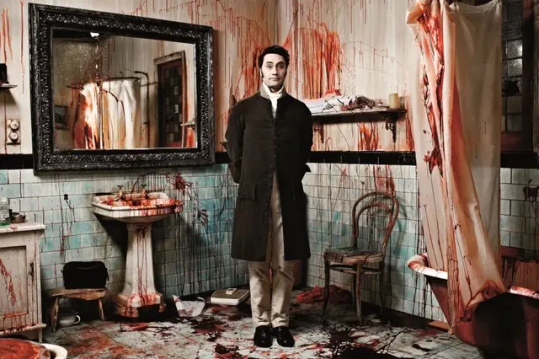
In the 2014 mockumentary horror film What We Do in the Shadows, which he co-directed with Jemaine Clement. (Alamy)
What about moving away from the niche New Zealand settings he represented so well in his early work? How does he stay connected to his roots? “I think you just need to know where you’re from,” he says, “and just don’t forget that.”
They certainly haven’t forgotten him.
Jasmin McSweeney sits in her office at the New Zealand Film Commission in Wellington, surrounded by promotional posters Waititi signed for her two decades ago, when she was tasked with promoting his nascent talent. Now the organisation’s marketing chief, she talks to me after visiting the heart of thriving “Wellywood”, overseeing the traditional karakia prayer on the set of a new movie starring Geoffrey Rush.
Waititi isn’t the first great Kiwi filmmaker – dual Oscar-winner Jane Campion and blockbuster king Peter Jackson come to mind – yet his particular ascendance, she says, has spurred unparalleled enthusiasm. “Taika gave everyone here confidence. He always says, ‘Don’t sit around waiting for people to say, you can do this.’ Just do it, because he just did it. That’s the Taika effect.”
-----------------------------------------------
Taika David Waititi is known for wearing everything from technicolour dreamcoats to pineapple print rompers, and today he’s wearing a roomy teal and white Isabel Marant jumper. The mohair garment has the same wispy frizz as his hair, which curls like a wave of grey steel wool, and connects with a shorn salty beard.
A stylish silver fox, it wouldn’t surprise anyone if he suddenly announced he was launching a fashion label. He’s definitely a commercial animal, to the point of directing television commercials for Coke and Amazon, along with a fabulous 2023 spot for Belvedere vodka starring Daniel Craig. He also joined forces with a beverage company in Finland (where “taika” means “magic”) to release his coffee drinks. Announcing the partnership on social media, he flagged that he would be doing more of this kind of stuff, too (“Soz not soz”).
Waititi has long been sick of reverent portrayals of Indigenous people talking to spirits.
There’s substance behind the swank. Fashion is a creative outlet but he’s also bought sewing machines in the past with the intention of designing and making clothes, and comes from a family of tailors. “I learnt how to sew a button on when I was very young,” he says. “I learnt how to fix holes or patches in your clothes, and darn things.”
And while he gallivants around the globe watching Wimbledon or modelling for Hermès at New York Fashion Week, all that glamour belies a depth of purpose, particularly when it comes to Indigenous representation.
There’s a moment in his new movie where a Samoan player realises that their Dutch coach, played by Michael Fassbender, is emotionally struggling, and he offers a lament for white people: “They need us.” I can’t help but think Waititi meant something more by that line – maybe that First Nations people have wisdom to offer if others will just listen?
“Weeelllll, a little bit …” he says – but from his intonation, and what he says next, I’m dead wrong. Waititi has long been sick of reverent portrayals of Indigenous people talking to kehua (spirits), or riding a ghost waka (phantom canoe), or playing a flute on a mountain. “Always the boring characters,” he says. “They’ve got no real contemporary relationship with the world, because they’re always living in the past in their spiritual ways.”
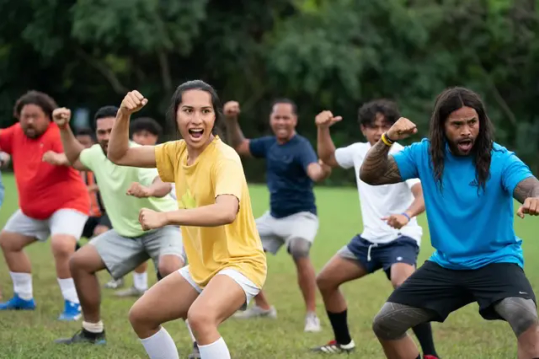
A scene from Next Goal Wins, filmed earlier this year. (Alamy)
He’s part of a vanguard consciously poking fun at those stereotypes. Another is the Navajo writer and director Billy Luther, who met Waititi at Sundance Film Festival back in 2003, along with Reservation Dogs co-creator Sterlin Harjo. “We were this group of outsiders trying to make films, when nobody was really biting,” says Luther. “It was a different time. The really cool thing about it now is we’re all working. We persevered. We didn’t give up. We slept on each other’s couches and hung out. It’s like family.”
Waititi has power now, and is known for using Indigenous interns wherever possible (“because there weren’t those opportunities when I was growing up”), making important introductions, offering feedback on scripts, and lending his name to projects through executive producer credits, too, which he did for Luther’s new feature film, Frybread Face and Me (2023).
He called Luther back from the set of Thor: Love and Thunder (2022) to offer advice on working with child actors – “Don’t box them into the characters you’ve created,” he said, “let them naturally figure it out on their own” – but it’s definitely harder to get Waititi on the phone these days. “He’s a little bitch,” Luther says, laughing. “Nah, there’s nothing like him. He’s a genius. You just knew he was going to be something. I just knew it. He’s my brother.“
I’ve been asked to explicitly avoid political questions in this interview, probably because Waititi tends to back so many causes, from child poverty and teenage suicide to a campaign protesting offshore gas and oil exploration near his tribal lands. But it’s hard to ignore his recent Instagram post, sharing a viral video about the Voice to Parliament referendum starring Indigenous Aussie rapper Adam Briggs. After all, we speak only two days after the proposal is defeated. “Yeah, sad to say but, Australia, you really shat the bed on that one,” Waititi says, pausing. “But go see my movie!”
About that movie – the early reviews aren’t great. IndieWire called it a misfire, too wrapped in its quirks to develop its arcs, with Waititi’s directorial voice drowning out his characters, while The Guardian called it “a shoddily made and strikingly unfunny attempt to tell an interesting story in an uninteresting way”. I want to know how he moves past that kind of criticism. “For a start, I never read reviews,” he says, concerned only with the opinion of people who paid for admission, never professional appraisals. “It’s not important to me. I know I’m good at what I do.”
Criticism that Indigenous concepts weren’t sufficiently explained in Next Goal Wins gets his back up a little, though. The film’s protagonist, Jaiyah Saelua, the first transgender football player in a FIFA World Cup qualifying match, is fa’afafine – an American Samoan identifier for someone with fluid genders – but there wasn’t much exposition of this concept in the film. “That’s not my job,” Waititi says. “It’s not a movie where I have to explain every facet of Samoan culture to an audience. Our job is to retain our culture, and present a story that’s inherently Polynesian, and if you don’t like it, you can go and watch any number of those other movies out there, 99 per cent of which are terrible.”
*notes: (there is video clip in the article)
Waititi sounds momentarily cranky, but he’s mostly unflappable and hilarious. He’s the kind of guy who prefers “Correctumundo bro!” to “Yes”. When our video connection is too laggy, he plays up to it by periodically pretending to be frozen, sitting perfectly still, mouth open, his big shifting eyeballs the only giveaway.
He’s at his best on set. Saelua sat next to him in Honolulu while filming the joyous soccer sequences. “He’s so chill. He just let the actors do their thing, giving them creative freedom, barely interjecting unless it was something important. His style matches the vibe of the Pacific people. We’re a very funny people. We like to laugh. He just fit perfectly.”
People do seem to love working alongside him, citing his ability to make productions fresh and unpredictable and funny. Chris Hemsworth once said that Waititi’s favourite gag is to “forget” that his microphone is switched on, so he can go on a pantomime rant for all to hear – usually about his disastrous Australian lead actor – only to “remember” that he’s wired and the whole crew is listening.
“I wouldn’t know about that, because I don’t listen to what other people say about anything – I’ve told you this,” Waititi says. “I just try to have fun when there’s time to have fun. And when you do that, and you bring people together, they’re more willing to go the extra mile for you, and they’re more willing to believe in the thing that you’re trying to do.”
Yes, he plays music between takes, and dances out of his director’s chair, but it’s really all about relaxing amid the immense pressure and intense privilege of making movies. “Do you know how hard it is just to get anything financed or green-lit, then getting a crew, getting producers to put all the pieces together, and then making it to set?” Waititi asks. “It’s a real gift, even to be working, and I feel like I have to remind people of that: enjoy this moment.”
Source: The Age
By: Konrad Marshall (December 1, 2023)
195 notes
·
View notes
Note
Hey, do you support Palestine? Our beliefs seem similar so I assume you do. I saw you reblogging some Percy Jackson stuff and wanted to let you know that it’s something we should be boycotting. Idk if interacting with fan posts counts but… you know.
Hi! Many people are choosing to boycott Percy Jackson specifically because of Riordran's statement about the genocide that he posted to his personal site, but Percy Jackson is not a boycott target listed by the BDS. Disney is, so you shouldn't be watching the show as a product of theirs, but the difference is why and what the goal of the boycott is.
On their site, the BDS states that Disney is a boycott target because "The Disney-owned Marvel Studios (US) is promoting in the next Captain America film a 'superhero' that personifies apartheid Israel. Both companies are therefore complicit in 'anti-Palestinian racism, Israeli propaganda, and the glorification of settler-colonial violence against Indigenous people,' as Palestinian cultural organizations have stated."
They also say "We must strategically focus on a relatively smaller number of carefully selected companies and products for maximum impact. We need to target companies that play a clear and direct role in Israel’s crimes and where there is real potential for winning... Compelling large, complicit companies, through strategic and context-sensitive boycott and divestment campaigns, to end their complicity in Israeli apartheid and war crimes against Palestinians sends a very powerful message to hundreds of other complicit companies that 'your time will come, so get out before it’s too late!'"
The ultimate goal is to put pressure on these companies to get them to withdraw their support of Israel, and while it's great that the fan percy jackson boycott happened to align with the requests of the BDS, they do warn against following random boycott lists that you might find on social media.
Disney is a pressure target, so you should follow their guidelines to boycott them effectively through purposeful action, namely by canceling your Disney Plus subscription (make sure to tell them why!), not buying their products, and putting pressure directly on the company on social media. 👍
TDLR:
interacting with fan content does not count because the target of the boycott is Disney, who won't feel it either way if you stop talking to your friends about Percy Jackson, but who will feel it if you cancel your Disney plus subscription and stop giving them money.
Listen to the people you're trying to help about what they need when it comes to boycotting.
#askbox#sorry this was kind of long#hit on some things that i find kind of annoying about the internet#mainly constant griping about “keep in mind” and “don't forget”#instead promoting of actual actionable steps that help people#or could (if actually done) accomplish what they want#and general flattening of messages when telephoned over large spaces#its why i only ever reblog posts about Palestine on this acct that have resources for direct action
49 notes
·
View notes
Text
NO- this is so cool but blowing my mind OK SO i'm now learning, ironically from finding this reporter talk about emily's recent film, that this is the SAME woman who "played" the reporter in the curse ?!! see THIS is the kind of thing that's integral to representing marginalized communities in film/tv. i am going to semi-formally elaborate below.
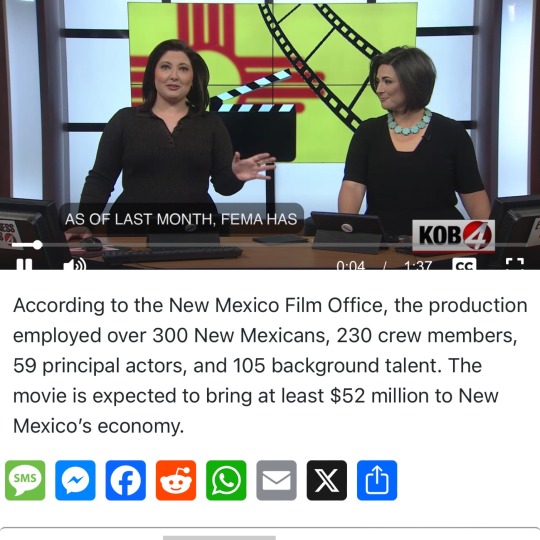
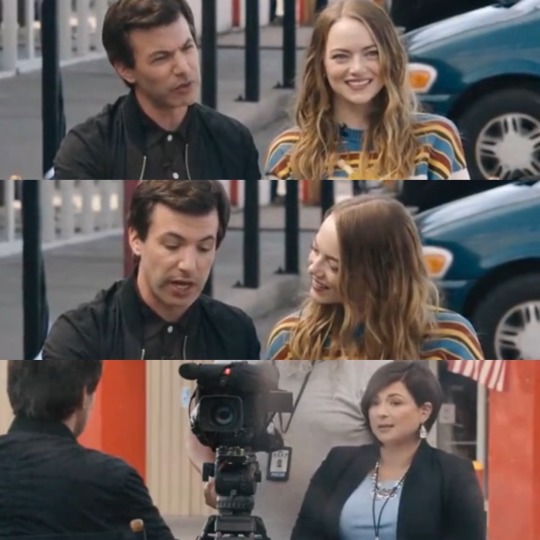
in brief, the majority of people acting in the curse, save for the main characters (also, a decent chunk of the crew came from española too) are locals of española regardless of whether they'd ever acted before and this was one of many intentional production decisions by emily et al. made to ensure they were reflecting española as it is. this included, as i learned months ago in a panel, them inviting everyone hired to feel free to tell them what issues they wanted highlighted most and delineate the setting given ... you know ... they LIVE there, if they wanted to and were assured that it'd all be written in. indeed, it was.
thus, a collaborative approach to portraying this community, which is paramount to true inclusivity and proper representation of the community in question in media as opposed to "oh well you can give us ideas but we're the ones in charge so really we're just pretending to give you a voice lol," which is often a major issue with research studies in my profession (non-marginalized researchers research marginalized communities but treat the people as subjects rather than collaborators but i digress), was executed.
it is this collaborative approach, in tandem with the producers' research on all the social issues it gets into (said research coming from marginalized peoples and/or scholars. it has been stated that emily did a ton of it along with her and her husband, dave mccary advocating for scenes improvised by the indigenous artist who plays cara, nizhonniya austin, that innately reflect her experiences engaging with performative white liberals), that make the curse so accurate. there are no excuses regarding white people having the ability to interrogate themselves as a collective effectively in a piece of media and emily et al. (nathan, benny, dave, etc.) have set a precedent with this.
fruit tree (emily and dave's production company) has continued to impress me with their deliberate choices to lend the tremendous power they have- emily in particular- to producing projects (i.e. i saw the tv glow, problemista, the curse, etc.) from creatives they see promise in that educate and comment on imperative social matters (i always love media being used as a form of activism through education when it's done right), making those who experience any pertinent system of oppression as it relates to their marginalized identity the chance to express their experiences in exactly the way they want to, and doing so in a genuinely inclusive manner. hollywood take note !!
#emma stone#emily stone#the curse#nathan fielder#benny safdie#film#tv#emmys 2024#emmys#activism#film producers#film production#tv production#tv shows#representation in media#dave mccary#i saw the tv glow#problemista#social satire#social critique#performative allyship#performative activism#gentrification#racism#classism#xenophobia#new mexico
13 notes
·
View notes
Photo
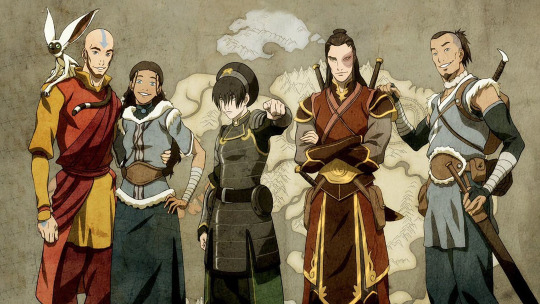
Everything we know about Avatar Studios’ first movie
It’s time for a good ol’ masterpost!
Here’s everything we here at Avatar News know about Avatar Studios’ first movie! Info that Avatar News is the exclusive source for is specified, otherwise everything is official public info from Paramount/Avatar Studios/etc.
Last updated on February 18th, 2023.
Title
The movie is currently designated “ANIMATED AANG AVATAR” in Paramount's slate, but is untitled
The Avatar franchise has been officially named “Avatar Legends” since 2022
A potential working title is Avatar The Last Airbender: Echoes and Aftershocks, based on a Paramount employee’s resume
A rumored title is Hidden Kingdom
Release
Release date: October 10th, 2025
Will be released in theaters exclusively at first, then stream on Paramount+ after
Previously estimated for 2024 internally at Paramount, but not announced publicly (source: Avatar News)
Story
Featuring “Aang and his friends”
Aang and Team Avatar will be young adults (source: Avatar News)
A movie with a Zuko-focused storyline was/is in development, it’s possible that this is that movie (source: Avatar News) - Update: The Zuko movie is separate
Brand-new original story, not an adaptation of an existing story from a comic, novel, etc.
Crew on this specific movie
Director: Lauren Montgomery (storyboard artist on ATLA, supervising producer on TLOK Books 2-4, showrunner of Voltron: Legendary Defender)
Writer: Kenneth Lin (Netflix’s House of Cards, Paramount’s Star Trek: Discovery)
Producers: Michael Dante DiMartino and Bryan Konietzko (showrunners of ATLA and TLOK, Chief Creative Officers of Avatar Studios), Eric Coleman (executive in charge of production of ATLA, suggested the creation of the character of Zuko in early development)
Production companies: Paramount Pictures, Nickelodeon Movies, Paramount Animation, Nickelodeon Animation Studio, Avatar Studios, Flying Bark Productions
Crew at Avatar Studios whose involvement in this specific movie, if any, we don’t know yet
Composer: Jeremy Zuckerman (composer of ATLA and TLOK)
Writer: Tim Hedrick (writer on ATLA/TLOK/VLD, showrunner of Fast & Furious: Spy Racers)
Head of story(board): Steve Ahn (storyboard artist and assistant director on TLOK)
Executive art director: Christie Tseng (character designer on TLOK)
Art director: William Niu (background designer on TLOK)
Consultant on native representation: Migizi Pensoneau (Reservation Dogs)
Many, many more crewmembers, of course.
Animation
Animation studio: Flying Bark Productions (Rise of the Teenage Mutant Ninja Turtles (2018-2020), Glitch Techs (2020), Monkie Kid (2020-), Marvel Studios’ What If...? (2021), Rise of the Teenage Mutant Ninja Turtles: The Movie (2022))
Animation style: traditional 2D + substantial CG
History of statements on animation style:
Sep 2 2021: “series of CG films” - Brian Robbins (president and CEO of Nickelodeon and chief content officer of kids and family for Paramount+)
Dec 2 2021: “outstanding and customized [...] unique production look” that “integrates [...] traditional 2D and CG” - Paramount recruiting for Avatar Studios
Jun 29 2022: “our main bread and butter is 2D animation” / “homage to anime” / “[not] gonna be [...] hardcore straightedge 2D” / “start with hand-drawn, handmade artwork and then: what can technology do to help us enhance it, to help us deepen it, to help the filmmaking, to make it more cinematic” / “not [...] starting purely 3D and then trying to stylize” / “looking hard to form our own look” / “not doing anything purely 3D” - Bryan Konietzko (Avatar Studios co-Chief Creative Officer)
Oct 13 2022: “2D Avatar feature film” / “couple traditional 2D animation with substantial CG elements” - Flying Bark Productions (the movie’s animation studio)
Cast
No cast info for this specific movie yet
Dante Basco is attached as Zuko, reprising his role from ATLA
A global casting call is going out for Asian and Indigenous voice actors in their 20s for Aang, Katara, Sokka, and Toph
Janet Varney, the voice of Korra in TLOK (2012-2014) has announced that she doesn’t want to voice Korra in the future; she wants an Indigenous voice actor to voice Korra (Korra is from the Water Tribe in the world of Avatar, which is inspired by Indigenous culture in the real world). It’s possible other voice actors will make the same choice.
Characters we know will definitely be in this movie:
Aang - previously voiced as a child by Zach Tyler Eisen in ATLA (2005-2008) and as an adult by D. B. Sweeney in TLOK (2012-2013)
Katara (source: Avatar News) - previously voiced as a child by Mae Whitman in ATLA (2005-2008) and as an elder by Eva Marie Saint in TLOK (2012-2014)
Zuko - see above
“Aang[’s] friends”
Other
Three theatrical animated movies are currently in development at Avatar Studios
Each movie has a standalone story-- they’re not a trilogy-- so the story of this movie won’t be continued in the next movie after it
The second movie is focused on Zuko (source: Avatar News)
The third movie is focused on the new earth Avatar after Aang and Korra (source: Avatar News)
The image above is official canon art of the Gaang as adults, but it’s from the lead-up to the release of The Legend of Korra in 2012, not from this upcoming movie. Fun fact: it was drawn by Joaquim Dos Santos, co-showrunner of TLOK and director of Spider-Man: Across the Spider-Verse (2023) and Spider-Man: Beyond the Spider-Verse (2024)!
249 notes
·
View notes
Text
— there are some things I want to say, many of which are regarding race!
The fact that Francesca Amewudah-Rivers is receiving hate the fact she’s playing Juliet is not surprising, since people do not need reasons to hate black women. She’s a dark-skinned pretty woman but of course, because she has prominent black features she’s seen as manly and shouldn’t be playing alongside someone like Tom Holland. I’m not one to put down people but Tom Holland is not God’s gift, and neither is he publicly defending his co-star, a matter that I won’t get into as the focus is Francesca. The role of Juliet is one that was originally played by a man, and since then has been played by people of different ethnicities, some being black women. The fact people are using her appearance or the fact she’s deemed as “not conventionally attractive” is disgusting as if that’s an excuse. I’m glad that over 800 black actors signed a letter in solidarity because of the racial abuse as well as the production company who issued their own statement.
POCs especially darker-skinned women are constantly the target of racial abuse even over things that don’t exist and yes I am talking about fan-casts, especially tangled. I haven’t watched the film but I know the source material isn’t from Brothers Grimm but a Persian poem written in the 10th century by Ferdowsi, 8 centuries before it was turned into a “German folklore.” It’s hilarious how micro-aggressions and racism come out when people think white characters aren’t at the centre of it all. People crying about how their younger selves Would hate to see a stunning South Asian actress in the place of a blonde hair, blue-eyed ADAPTION of an original when brown and black girls had little to no representation at all. “Why can’t we stick to the originals?” Please look up what the original is before you start with your insults specifically those who are crying on TikTok or trolling on Avantika Vandanapu’s Instagram.
And lastly, stop bringing Tiana into it. She’s based on a real person just like Pocahontas, their race is important to their stories, black and indigenous, it’s tiring and also just foolish to post edits of “if they can have an Asian Rapunzel why can’t we have a white Tiana” when it’s clear that missed the plot of the princess and the frog, blind to/ ignoring its micro-aggressions (that are written in solely for a black character) and are just showing their bias all in defence of a film that doesn’t even exist.
And before anyone starts on “Why don’t you just invent your own characters?” Many have tried and the movie itself wasn’t watched, had little to no promotion or has been whitewashed but of course that gets little backlash.
And don’t get me started on wish…
So just to conclude, stop attacking us!
#black women#romeo and juliet#Tom holland Romeo and Juliet#francesca amewudah rivers#she doesn’t need this hate nor does she deserve it!!!#why are black women so hated?!#leave us alone#people need to speak out#wtf?!#fan cast are making people cry… get a grip#white fragility#white feminism#stop it omg#rapunzel#rapunzel was based on a Persian poem#avantika#tiana#pocahontas#Asian rapunzel#black#indegenous#theatre#black actors#black performers#shakespeare#national theatre#the globe
11 notes
·
View notes
Text
Multimedia company N LITE is producing a film titled MFINDA, which it refers to with the term "AFRIME," or "afro-anime." The company unveiled visuals for the film in English and Japanese:

N LITE describes the story:
MFINDA tells the story of a young girl, Odi, who is transported into the past where she joins another young girl, Nasambi. They must venture into the MFINDA and confront evil spirits to reclaim the Nkisi if she has any hope of returning home.
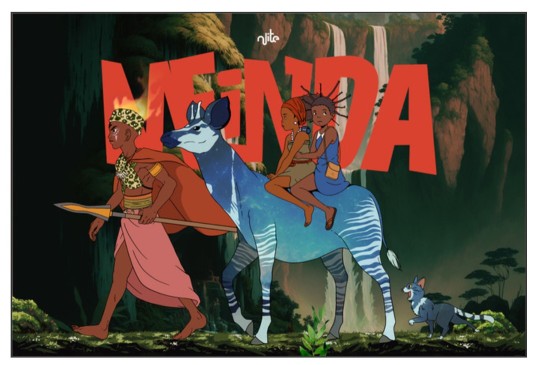
Christiano Malik Terry, founder of N LITE, also leads N LITE Japan with Shin Koyamada (The Last Samurai, Wendy Wu: Homecoming Warrior) and Shigeru Igari (former CEO of Atlus). N LITE is producing MFINDA in Japan. Donald H. Hewitt (Spirited Away's English screenplay) and MFINDA creator Patience Lekien are writing the screenplay. The production credits Lekien and Terry with the story.
N LITE Japan teased that it will announce its partnership with a Japanese producer and international Oscar-nominated production team next month.
N LITE aims to bring black and indigenous stories in partnership with global creators. AFRIME, or afro-anime, is its hand-drawn 2D animation. The company plans to produce AFRIME films and television series. N LITE Japan is working on upcoming projects based on anime and manga IP.
Source: Email correspondence
#anime#afro-anime#afrime#mfinda#representation in media#representation in anime#animation#movies#ann#anime news#anime news network#long post
49 notes
·
View notes
Text
i think what irks me the most about the discourse surrounding margot and greta not getting nominated is that people are grossly downplaying either of their accomplishments? the barbie defenders have looped around to being regressive because why are you acting as if barbie is THE most important film that either of them have ever done or WILL ever do?
not even counting the unquantifiable cultural impact, greta and margot are both highly decorated entertainers. margot has been nominated for two academy awards, both acting. both of greta gerwig's films have been nominated for academy awards, and have won multiple awards. it's almost embarrassing to watch people act as if these women in their thirties haven't been in the entertainment business for years?
now what really gets me is how much these people are downplaying other accomplishments. two black women and one honduran woman in the supporting actress category! three black men nominated for acting awards! an indigenous woman being nominated for the first time in history! many lifelong actors are being recognized for their decades of work – paul giamatti, cillian murphy, jeffrey wright, sterling k. brown (to name a few). justine triet's historic best director nomination. godzilla minus one being the first japanese film to be nominated for best visual effects. killers of the flower moon, past lives, and american fiction receiving best picture noms – films with nonwhite leads.
and on top of that? margot robbie IS being recognized for her work on barbie in a historic way – she's receiving her first EVER oscar nomination as a PRODUCER of a film in the BEST PICTURE category – meaning, regardless if barbie wins or not, she is now an academy award-nominated producer who owns her own production company (luckychap) meaning she will absolutely use this momentum to put more women's stories to screen.
i'm just confused as to why we're acting like barbie didn't receive 8 nominations? you're demeaning women of color to prop up your favorites (who would hate you for that, by the way) when margot robbie and greta getwig are NOT the examples you should be using to do so, because both of them were successful before barbie, and will be even MORE successful after barbie.
you should focus your energy on supporting frontrunners like lily gladstone, da'vine joy randolph, danielle brooks, etc.
i'm also very confused as to why we're acting as if the academy voter's nominations have EVER reflected the public's opinion, especially considering they're roughly 75% middle aged white men. do you really think those men resonated with american ferrera's monologue? be honest with yourselves.
#i'm not even saying any of this in defense of margot robbie and greta gerwig as PEOPLE#i'm saying this objectively .. because y'all are objectively wrong#i didn't mention ryan gosling because i don't care to but he is quite literally an academy darling in the same way leo is#may not get nominated or win every year but people recognize his talent anyway#i'm just fed up to be honest#there are better posts that are smarter than mine that are in defense of lily/da'vine/danielle/etc#i'm just here to criticize the hypocrisy of the white women supposedly uplifting their token white favs
6 notes
·
View notes
Note
Why do you hate MCU or George Lucas? I'm not against that hate, I'm just curious of your reasons.
The bandwidth that the MCU and Lucasfilms dominate in the film industry prevents a majority of new IPs or concepts from reaching further production - because film production companies aren't there to bolster up-and-comers, they're there to make money.
MCU and Lucasfilms make lots and lots and lots of money by cloning the same two story ideas over and over again because they know an overly nostalgic and traumatized public will keep paying for them.
The formula makes billions of dollars every time a film gets released, the stagnation of media culture doesn't matter next to a paycheck like that.
Lucasfilms in particular I take issue with because they really really lean into the exoticization (and then the repetitive abuse and wholesale slaughter of) indigenous communities through their writing. Use of the "Pretty Native Alien Woman" and the "Pragmatic Survivalist Race" is consistent throughout all the iterations of the franchise, and no one really seems to be talking about that.
rip every Sand Person. y'all just repelling colonizers and the writers kill you off like mice in a combine blade - and usually for laughs, no less.
These companies are not here to be progressive, they are here to take your money. Any inch they give to LGBT+ or POC character representation is immediately contradicted and cheapened by the film's own writing.
How long was that gay kiss in RoS? Did they follow it up with a joke?
Is Valkyrie still Bi?
Be critical of big franchises folks, I'm begging you. Otherwise we'll be watching Yet Another White Superhero Lead and George Lucas's Hero Fantasy Part 50 until we all die.
27 notes
·
View notes
Text
billions season 7 casting calls: april 16-30, 2023
‘Billions’ Season 7, Native American Female (posted April 19; expires April 23; shoots April 25 in NYC)
Production Description: Casting a Native American female photo double for season 7 of Showtime’s “Billions.”
Native American Female Photo Double: Background / Extra, Female, 25-45. Height 5’6-5’9. Approx. 190lbs. Dress 12-14. Pants 14. Shoe 8.5-9. Ethnicity: Indigenous Peoples. [Posted April 19]
Rehearsal and Production Dates & Locations: Shoots Tues., April 25 in NY.
(grant wilfley casting posted an equivalent casting call on april 19. there are two existing characters who are native american women — roxanne, senior’s second wife, and jane halftown, a council member of the cayuga nation of new york. the age range and height seem to match roxanne, but i’m not sure about the other measurements.)
Billions Chinatown Visitors (posted April 21; shoots April 28 in NYC)
Production Description: #gwciseeking people to portray Chinatown Visitors for the seventh season of the Showtime series BILLIONS. Seeking people from the NYC-Chinese Community.
Rehearsal and Production Dates & Locations: Filming in NYC area.
(is that visitors To chinatown, or visitors From chinatown? requesting members of “the NYC-Chinese Community” might mean the latter, but the april 28 shoot in chinatown, matching this shoot date, might mean the former.)
Billions Beautiful Receptionists (posted April 21; shoots May 8-10 in NYC)
Production Description: #gwciseeking female models to portray Beautiful Receptionists for the seventh season of the Showtime series BILLIONS.
Rehearsal and Production Dates & Locations: Filming in NYC area.
(it seems late in the season to add new receptionists to prince cap. are they working for another hedge fund? another office entirely?)
‘Billions’ (posted April 25; expires May 3; shoots May 8-9 in NYC)
Production Description: Casting season seven of Showtime’s “Billions.”
Investment Company Traders (Non-SAG Covered): Background / Extra, 25-55. People to portray investment company traders. [Posted April 25]
Rehearsal and Production Dates & Locations: Shoots May 8 and 9 (plus future work dates through May) in NY.
(overlaps with the shooting dates for the receptionists. is someone starting up yet another new hedge fund? maybe axe global, if that sign stays up past april 27?)
Billions Political Rally Audience (posted April 27; shoots May 8 in NYC)
Production Description: #gwciseeking #extras to portray Political Rally Audience for the seventh season of the Showtime series BILLIONS.
Rehearsal and Production Dates & Locations: Filming in NYC area.
(my first instinct was that this was for prince’s presidential run, but would he hold a rally 5+ years before the election? i mean, it’s prince, so he might, but i don’t know if it would hold water story-wise. could be for someone else up for election — maybe dave seeking to keep the attorney general’s seat or sacker running for office.)
2 notes
·
View notes
Text
Diversity Progresses in Still White Male Dominated Brazilian Production Sector

In Brazil, where the majority of the population are of African origin, persons of color are traditionally under-represented on above-the-line TV and film production. This, however, is gradually changing.
For the past years, POC talents, as well as residents from the impoverished urban areas, LGBTQ and indigenous people, have gained ground in the still white-male dominated production sector.
The diversity drive resisted four years of an extreme-right government and ironically benefited indirectly from it, in the view of director and screenwriter Janaina Oliveira, vice-president of local Association of Black Audiovisual Professionals (APAN).
As the Bolsonaro administration (2019-2022) withheld coin from government incentives, said 42-year-old Oliveira, indie producers resorted to commissions from the large international streaming companies.
“Netflix, Amazon and the other streaming companies have adopted policies that stimulate diversity in their productions, especially after the Black Lives Matter movement, and they enforced them in Brazil. George Floyd had an impact here,” said Oliveira.
“We have always being the majority on below-the-line positions, in lightening, catering, driving. But now we see Blacks in writers’ rooms, and directing and producing.”
Continue reading.
#brazil#cinema#television#politics#anti racism#racism#indigenous#LGBT#favelas#mod nise da silveira#image description in alt
3 notes
·
View notes
Text

My new book, A New Approach to Understanding Rhythm in Indian Music was published on 20th January 2023, by Cambridge Scholars Publishing.
Presenting a comprehensive overview of some major traditional Indian rhythms, this book adopts a novel visual approach towards representing these rhythms (for example, Tāḷa/Tāl) in a graphic, tabular ICT (Information Communication Technology) format. It offers insights into structural aspects of beauty in Indian rhythms, and covers examples from ancient to contemporary music, including folk, classical and popular film songs. The tabular informative approach used in this book may also be applied to the study of other forms of traditional music across the world, such as folk music of Eastern Europe and indigenous music from other parts of Asia, the Americas, Australia, and Africa.
Link to purchase book: https://www.cambridgescholars.com/product/978-1-5275-8812-7
Publisher info:
@CamScholars (Twitter);
@CambridgeScholarsPublishing (Facebook);
@cambridgescholarsofficial (Instagram);
www.linkedin.com/company/cambridgescholarspublishing/ (LinkedIn).
1 note
·
View note
Text
Filmmaker Catherine Bainbridge examines the role of Native Americans in contemporary music history. She exposes a critical missing chapter, revealing how indigenous musicians helped influence popular culture.

Release date: July 26, 2017 (USA)
Directors: Catherine Bainbridge, Alfonso Maiorana
Produced by: Stevie Salas; Tim Johnson; Catherine Bainbridge; Christina Fon; Linda Ludwick; Lisa M. Roth; Tim Johnson
Production company: Rezolution Pictures
Music composed by: Benoît Charest, Ben Charest
4 notes
·
View notes
Text
"Disney+ to Release 2012 Blockbuster 'Avengers' Dubbed in Lakota" (5 June 2024):
On June 14, Disney+ will release the Avengers film dubbed entirely in the Lakota language, marking a pivotal moment for Indigenous representation in mainstream media.
This groundbreaking project is the result of Grey Willow Music Studios & Production, a Native-owned sound company, along with the help of the Lakota Reclamation Project, students from McLaughlin school, elders from the Standing Rock community and many others.
"Our goal is to bring the Lakota language into living rooms and give our community something to be proud of. This project is not just ours; it's for the people," Cyril "Chuck" Archambault (Standing Rock), Executive Producer of the Lakota Dub Avengers, told Native News Online.
The project traces back to a conversation between the Grey Willow sound production team a few years ago. They envisioned dubbing a major Hollywood film in Lakota to help reintroduce and promote the Lakota language.
Archambault reached out to actor Mark Ruffalo, who had previously shown support for Native American issues during the Dakota Access Pipeline protest. Ruffalo's interest sparked a series of events leading to a pivotal meeting with Marvel and Disney.
"We explained that we wanted to reintroduce the Lakota language into our homes, something that had been lost over time. We thought dubbing the Avengers, a movie our kids already love, would be a great way to do this," Archambault said. "Seeing kids dressed as Captain America and Iron Man during Halloween showed us how much they connected with these characters."
With the backing of Marvel and Deluxe Studios, the project received a green light. The Grey Willow team spent approximately 15 months dubbing 2012's "The Avengers" into the Lakota-Dakota language, employing 62 local speakers to translate and record the script.
[...] Translating a blockbuster like Avengers into Lakota presented unique challenges. The team had to navigate the complexities of the Marvel Cinematic Universe (MCU) and translate technical terms like "Tesseract" into Lakota. Elders played a crucial role in this process, helping to create new terms for concepts that didn't exist in the language.
"Lakota is a very descriptive, verb-based language, which made translating certain words tricky," Ray Taken Alive (Standing Rock), Executive Producer of the Lakota Dub Avengers, told Native News Online. "For instance, the word 'tank' in English is one syllable, but in Lakota, the translation was a phrase describing its characteristics, which took about 17 syllables. This created timing issues since a single word in English could take several seconds to say in Lakota."
Early screenings of the film have received overwhelmingly positive feedback from the community.
"Elders and community members continually approach us, expressing their happiness and pride in this project. Many have shared that they never had such opportunities when they were younger, which makes this all the more significant," Taken Alive said.
Taken Alive and Archambault see this project as just the beginning. They envision creating curriculum materials based on the film and incorporating Lakota language projects into popular media to promote and preserve the Lakota language and culture.
"The potential for educational use is vast. One of my dreams is to incorporate this work into Marvel Comics, creating educational resources that are freely available to our indigenous people," Archambault said. "This project is just the beginning, and there's so much more we can achieve together."
As the release date approaches on June 14, the excitement and anticipation within the Lakota community is building. Viewers around the world will soon witness a historic moment as the Avengers speak Lakota, bringing a piece of the Lakota culture into living rooms globally.
"This film is more than just a one-time project; it will have a lasting impact," Archambault said. "It's an incredible feeling knowing that we've created something that will help preserve and promote our language and culture for years to come."
0 notes
Text
youtube
Prama India Brand Film 2024
Prama India showcases its commitment to revolutionize security solutions by discovering how we harness innovation to safeguard our world, offering cutting-edge technologies and unparalleled services.
The journey of excellence and trust as we redefine security standards. Prama India has a state-of-the-art manufacturing facility near Mumbai. We manufacture high-quality video security products as per Indian standards and market requirements. The company is continuously enhancing its indigenous manufacturing capabilities by making advanced video security products. Our R&D Center continuously strives to develop new tech innovations for smart security applications. we are well-equipped manufacturing facility reaffirms a long-term commitment to the indigenous product manufacturing roadmap.
PRAMA has a long-term plan to empower India through innovative security products and solutions.
0 notes